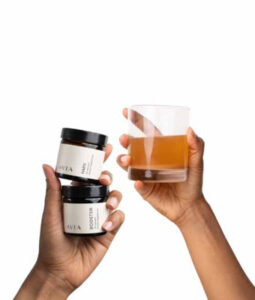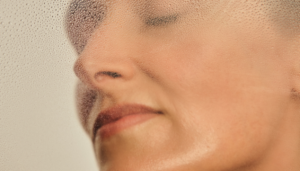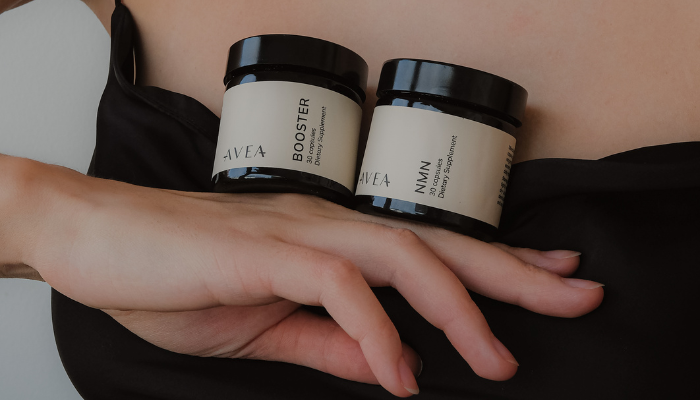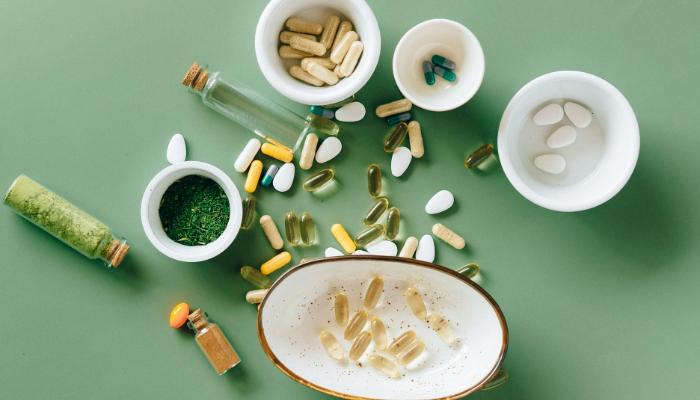Have you ever wondered why your energy levels fluctuate, or why your skin feels dull despite all the creams and serums you apply?
It might have something to do with your body’s need for Vitamin B3. This essential vitamin is often overshadowed by other nutrients, but it’s quietly working behind the scenes to keep your body functioning at its best.
Vitamin B3—also known as niacin—is one of those vitamins you might not think about often, but trust us, it’s crucial.
Whether it’s turning food into fuel, helping your skin bounce back from stress, or even supporting your brain health, Vitamin B3 does it all. And here’s the kicker: It exists in two forms, Niacinamide and Niacin, both offering unique benefits.
In this Avea article, we’ll take you through the science and the everyday applications of Niacinamide (Vitamin B3) supplements, so you can understand exactly how they support your health and longevity.
In this article
What is Niacinamide? Is it Vitamin B3?
Niacinamide, a form of Vitamin B3, is a water-soluble vitamin essential for various cellular processes, including energy production, DNA repair, and cell health.
Unlike niacin, it doesn’t cause flushing and is commonly used in skincare for its anti-inflammatory and moisture-retention benefits.
It supports skin health, brain function, and overall vitality. Niacinamide can be obtained through diet or as a supplement, making it a popular choice for enhancing both beauty and well-being.
Niacinamide is also used medically to treat conditions related to niacin deficiency, such as pellagra, which can cause symptoms like diarrhoea, dermatitis, and dementia [1].
What’s Niacin?
Niacin, another form of Vitamin B3, is primarily known for its role in improving cardiovascular health by lowering cholesterol levels. Unlike niacinamide, niacin can cause a “flushing” effect, leading to redness and warmth in the skin.
It helps the body convert food into energy, supports metabolism, and is vital for DNA repair. Niacin is commonly used to manage cholesterol and boost circulation, making it a powerful supplement for heart and metabolic health.
Difference between Niacinamide and Niacin
Niacinamide and niacin are both forms of Vitamin B3, but they differ structurally and functionally.
- Niacin (nicotinic acid) is an acidic form of Vitamin B3, often used for managing cholesterol levels. It undergoes conversion into NAD+ (nicotinamide adenine dinucleotide), a vital coenzyme for energy metabolism, in the body. Niacin can cause vasodilation, leading to the characteristic “niacin flush.”
- Niacinamide (nicotinamide) is the amide form of Vitamin B3, which does not cause flushing. It also converts into NAD+ but focuses more on skin health, DNA repair, and anti-inflammatory effects [2]. Importantly, niacinamide does not affect lipid metabolism like niacin.
Your body can make niacinamide from niacin supplements. This happens when there’s an excessive amount of niacin in the body. Tryptophan in your body can also be converted into niacinamide.
Although Niacin and Niacinamide can convert into each other in the body, they have different effects and side effects. Niacin has been associated with increased risk of major cardiovascular events at high doses, whereas Niacinamide does not carry this same risk. Be sure to know which form you are taking
Common names of Niacinamide
- Vitamin B3
- Nicotinamide
- Nicotinic acid amide
- Nicotinic amide
- Vitamin PP
To simplify things, we will mostly use Niacinamide throughout the article.
What is Niacinamide good for?
Niacinamide, or Vitamin B3, has been widely studied for its impressive range of health benefits, particularly in the fields of dermatology and other medical applications.
Not only does it help improve skin health, but research also shows its potential to boost brain function, visual health, and more.
Whilst Niacinamide works wonders on its own, its effects are further amplified when combined with other powerful ingredients.
1. Avea’s solution: The Longevity Bundle
In Avea’s Booster, we included 16 mg of Niacinamide, which works in synergy with five other potent antioxidants to target multiple hallmarks of ageing, at the cellular level.
The best supplements to boost longevity

- Effective trio: Booster, NMN, and Collagen Activator.
- Addresses signs of ageing comprehensively.
- All-star longevity ingredients.
- Boosts cellular renewal and energy.
- Enhances collagen production.
- Recommended by biohackers and health experts.
This blend helps protect your skin from oxidative stress, enhances energy production, and supports cellular repair—all essential components of a well-rounded wellness routine.
The Longevity Bundle, which includes NMN, Booster, and Collagen Activator, is designed to work synergistically to boost NAD+ levels.
This powerful combination helps replenish cellular energy, supports DNA repair, and promotes overall vitality, targeting ageing from the inside out.
This trio works in harmony to boost collagen production, enhance skin rejuvenation, and promote deep, restorative sleep, all while helping to maintain long-lasting energy and support overall health.
2. Improvement in ageing skin
One of niacinamide’s most well-known benefits is its ability to combat the visible signs of skin ageing.
Studies have shown that it can significantly reduce the appearance of fine lines, wrinkles, hyperpigmented spots, and red blotchiness. Niacinamide has been found to also decrease skin sallowness (yellowing), giving the skin a more youthful and even tone [3].
3. Enhanced skin elasticity
Topical niacinamide has been shown to improve skin elasticity, making your skin appear firmer and more resilient. This effect is particularly beneficial in reversing the sagging skin that comes with age.
4. Improved skin barrier function
Another critical benefit of niacinamide is its ability to strengthen the skin barrier. A healthy skin barrier is essential for protecting your skin from environmental stressors and preventing water loss.
Niacinamide helps the skin develop a ceramide (lipid) barrier, which locks in moisture, keeping the skin hydrated and reducing dryness or irritation. This is especially beneficial for those with eczema, dry, or mature skin.
5. Minimises redness and blotchiness
Thanks to its anti-inflammatory properties, Niacinamide helps reduce redness and inflammation caused by skin conditions like eczema, acne, and rosacea. By calming the skin, it improves texture and tone, giving the complexion a more even appearance.
6. Sebum regulation and minimising pore size
Niacinamide has the unique ability to regulate sebum production, preventing your skin’s oil glands from going into overdrive. This makes it particularly beneficial for those with oily or acne-prone skin. Over time, niacinamide’s moisture-retaining effects can also reduce pore size, keeping skin smooth and balanced.
7. Protects against sun damage
Niacinamide not only helps repair damaged skin cells but also protects them from future UV damage.
By rebuilding healthy skin cells, it provides a protective barrier against the harmful effects of the sun’s rays, making it an excellent addition to your sun protection routine.
In addition to protecting skin cells from future UV damage, oral niacinamide has shown promise in preventing nonaggressive skin cancers in patients with sun-damaged skin.
It has also been found to reduce actinic keratoses, which are often a precursor to melanoma.
8. Treats hyperpigmentation
Research has found that 5% niacinamide concentrations can help lighten dark spots and reduce hyperpigmentation. This improvement is often noticeable within a few weeks and may be linked to increased collagen production, leading to a more even skin tone.
9. Antioxidant properties
Niacinamide offers antioxidant protection by defending skin cells against oxidative stress. Environmental factors like pollution and UV rays can lead to oxidative damage, affecting DNA, lipids, and proteins within the skin. Niacinamide helps neutralise these damaging effects, thus protecting the skin from premature ageing and maintaining its health.
10. Anti-inflammatory properties
Niacinamide’s anti-inflammatory properties help reduce redness and inflammation caused by rosacea and other inflammatory skin conditions. It is also known to help with hyperpigmentation and can even prevent hair thinning in some cases.
11. Minimises fine lines and wrinkles
By boosting collagen production and improving skin elasticity, niacinamide helps reduce the appearance of fine lines and wrinkles caused by sun damage and the natural ageing process.
12. Treats acne
Niacinamide has shown promise in treating severe acne, especially inflammatory forms like papules and pustules. Over time, regular use can reduce lesions and improve overall skin texture, making it a popular choice for acne-prone individuals.
13. Osteoarthritis
Beyond its skin-related benefits, niacinamide has been studied for its potential role in managing osteoarthritis. Research suggests that niacinamide can improve joint flexibility and reduce inflammation, allowing patients to reduce their reliance on anti-inflammatory medications. This highlights niacinamide’s potential as a natural adjunct therapy for joint health and inflammation management.
14. Phosphorus metabolism in dialysis patients
Niacinamide has also shown promise in improving health outcomes for hemodialysis patients by helping to manage hyperphosphatemia—a condition where phosphorus levels in the blood are too high. Niacinamide reduces serum phosphorus levels, which is crucial for dialysis patients who struggle with phosphorus management. Additionally, niacinamide has been shown to increase HDL cholesterol levels, supporting better cardiovascular health in these patients.
15. Brain and eye health
Nicotinamide plays an essential role in protecting both the brain and eyes from oxidative stress and cellular damage. Its ability to increase NAD+ levels supports cellular repair and energy production, which is crucial for maintaining cognitive function and reducing the risk of neurodegenerative diseases like Alzheimer’s.
In addition, nicotinamide’s anti-inflammatory and antioxidant properties help mitigate the damage caused by oxidative stress. Studies have shown that it also has potential benefits for eye health, improving inner retinal and visual function in patients treated for glaucoma. This makes nicotinamide a valuable supplement for supporting both brain and visual health.
What foods are high in Niacinamide?
Foods rich in niacinamide are typically those that naturally contain Vitamin B3, as your body can convert niacin from these sources into niacinamide.
Here are some foods to make sure to get from your local supermarket:
- Animal products:
- Chicken breast
- Turkey
- Tuna (canned or fresh)
- Salmon
- Beef liver
- Pork
- Plant-based sources:
- Brown rice
- Peanuts
- Sunflower seeds
- Mushrooms (particularly portobello)
- Legumes (like lentils and beans)
- Fortified foods:
- Breakfast cereals and grains are often fortified with niacin, which contributes to niacinamide intake. But we do not recommend eating cereals due to the harmful effects of sugar spikes.
Mechanism of action of Niacinamide
Niacinamide is chemically part of the coenzymes’ nicotinamide adenine dinucleotide NAD+ and NADH, used in oxidation-reduction reactions in your body. Amongst these activities is the production of adenosine triphosphate (ATP), which fuels cellular metabolic activities.
The photoimmunoprotective effects of oral or topical niacinamide are linked to its ability to support DNA repair by preventing the drop in cellular energy after UV exposure or by replenishing energy in irradiated cells.
It influences various pathways that enhance the repair of UV-induced DNA damage. Its role in skin cancer prevention is partially due to the reduction of inflammatory macrophages.
In UV-exposed keratinocytes, niacinamide reduced the expression of cytokine mediators like IL-6, IL-10, MCP-1, and TNF-alpha mRNA, which are involved in inflammation, tissue damage, cell death, and skin cancer.
In human melanocytes, niacinamide increased the overall nucleotide excision repair rate and the number of irradiated melanocytes undergoing DNA repair.
How long will Niacinamide stay in your system?
Niacinamide is a water-soluble form of Vitamin B3, so it doesn’t stay in your body for long. After ingestion, any excess is typically excreted in the urine within 4 to 6 hours.
However, the effects of niacinamide, particularly on skin health and cellular repair, can last longer. To maintain its benefits, regular and consistent supplementation is recommended, allowing your body to maintain steady levels of this essential nutrient.
Is Niacinamide safe?
Nicotinamide is generally well tolerated, but it’s important to know that high oral doses can lead to some unwanted side effects.
Issues like nausea, vomiting, and other gastrointestinal symptoms, as well as headache, fatigue, dizziness, and even liver toxicity have been reported with higher doses.
For those on hemodialysis, there’s an increased risk of thrombocytopenia (low platelet count), as seen in a meta-analysis of clinical trials involving nicotinamide use.
Additionally, people taking statins alongside nicotinamide have reported a higher risk of myopathy and rhabdomyolysis (muscle damage).
Besides, excessive niacin supplementation, though not niacinamide, has been linked to an increased risk of major adverse cardiovascular events (MACE).
This means healthcare providers need to carefully weigh the risks and benefits before recommending niacin, particularly for those with pre-existing cardiovascular conditions or aiming to manage low HDL-cholesterol or high triglyceride levels.
At Avea, we focus on developing science-backed formulations that use carefully measured doses to ensure safety and efficacy.
For example, the 16 mg of niacinamide in our Booster is perfectly balanced to offer all the health benefits without overwhelming your system.
Our blend is crafted to work synergistically with other antioxidants, ensuring maximum effectiveness while remaining gentle on the body.
Can everyone take Niacinamide?
No, not everyone should take Niacinamide. Whilst it is generally safe for most people, there are some situations where caution is needed.
1. Do not take if:
- You’re on anticonvulsants like carbamazepine: Nicotinamide can raise the levels of this medication in your blood, increasing the risk of side effects. Always consult with your doctor before combining the two.
- You have low platelets: Research suggests that nicotinamide could increase the risk of thrombocytopenia (low platelet count). If this applies to you, speak with your healthcare provider first.
2. Special points to consider:
- Cardiovascular disease: If you have a history of heart issues, it’s important to check with your cardiologist before starting nicotinamide.
- Not a sunscreen substitute: Whilst nicotinamide helps protect against UV damage at a cellular level, it’s not a replacement for sunscreen and doesn’t prevent sunburn.
- Niacin vs. Nicotinamide: Although niacin and nicotinamide can convert into each other in the body, they have different effects and side effects as supplements. They’re not interchangeable, so be mindful of which one you’re using.
When should Niacinamide supplements be taken?
Niacinamide supplements are best used when aiming to support skin health, brain function, and overall cellular vitality.
It can be taken daily, with or without food, but it is always advisable to follow recommended dosages to avoid side effects.
Consult with a healthcare professional for personalised advice.
Ultimately, the key is consistency—taking your niacinamide supplement at the same time each day helps your body maintain steady levels of Vitamin B3 for optimal results.
References
















